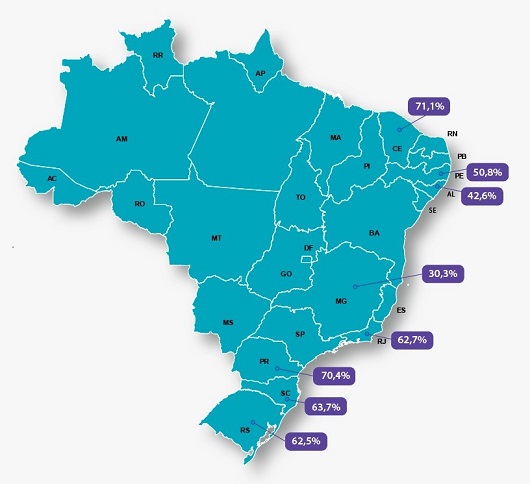Fiocruz identifies a mutation associated to worrying variants in Brazil
08/03/2021
Pamela Lang (AFN)
In a technical release issued last Thursday (March 3) by the Fiocruz Covid-19 Observatory, researchers warn of the geographical dispersion, in the territory, of “worrying variants” and of their high prevalence in the three Brazilian regions under study (South, South-East and North-East).
The new RT-PCR protocol, developed by Fiocruz Amazônia, was used by Fiocruz diagnostic support units and testing stations to evaluate about one thousand samples from the states of Alagoas, Minas Gerais, Pernambuco, Paraná, Rio de Janeiro, Rio Grande do Sul and Santa Catarina. The protocol detects a mutation common to three of the “worrying variants” (P.1, first identified in the state of Amazonas, B.1.1.7, in the United Kingdom, and B.1.351, in South Africa), which are potentially more transmissible. The evaluation was supported by the Ministry of Health, by means of the Secretary of Surveillance in Health and of the General Coordination of Public Health Laboratories.

According to the Observatory, the intense circulation of people and the increase in Sars-CoV-2 propagation has favored the appearance of “worrying variants” in Brazil, such as the P1 variation identified in Amazonas. The release warns of a worrying scenario that combines the potentially more transmissible profile of these variants to the absence of measures that could help prevent viruses from disseminating and circulating.
Of the eight states evaluated in this analysis, only two showed the prevalence of the mutation associated with worrying variants below 50%: this was the case in Minas Gerais, which had 30.3% of the samples tested positive for the mutation, and Alagoas, with 42.6%. In the remaining states, more than 50% of the samples were identified as having the mutation associated with the “worrying variants”, according to the map below.
With regards to the challenges set by the high dispersion and prevalence of the “worrying variants”, the Observatory emphasizes the guidelines defined by the National Council of State Health Secretaries (Conass), as well as the need to obtain more vaccine doses for the National Immunization Program (PNI), with the goal of helping reduce the number of cases and the probability of new variants.
The Release also highlights how it is crucial to adopt the measures already described in a previous extraordinary Bulletin published last Wednesday (March 3), focusing on non-pharmacological measures that can reduce both dissemination speed and the number of cases, such as stricter circulation restriction measures, closing of non-essential activities, and the immediate implementation of communication plans and campaigns, the strengthening of the health system, and the need for a national pact to fight the pandemic in the country.
New protocol offers massive monitoring of “worrying variants”
For Marco Krieger, Vice-President of Health Production and Innovation, genomic surveillance and monitoring of these variants will be crucial to fight the pandemic. “The new RT-PCR protocol offers a rapid picture of the circulation of the variants to support decision-making when it comes to the fight against the pandemic”, Krieger emphasizes.
Assessment using this protocol will be increased and repeated systematically to reach massive monitoring of the variants, and genomic surveillance will be complemented with the sequencing of samples by Fiocruz’s Genomic Network.
Up to this moment, these variants have not shown a clear association with a more severe clinical evolution, but ongoing studies are attempting to clarify aspects related to the genetic sequencing of these variants, as well as their transmissibility and their real impact on the dynamic of Covid-19 occurrence.



